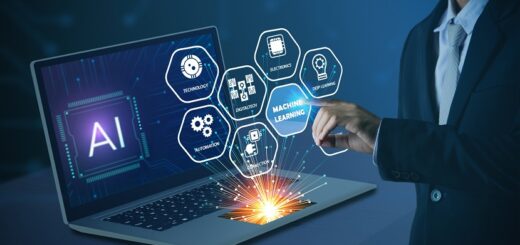Harnessing AI for Business Success: Strategies, Readiness, and Future Trends
The advent of artificial intelligence (AI) has marked a paradigm shift in how businesses operate across various sectors. From streamlining operations to enhancing customer interactions, AI has become a pivotal element in the modern business toolbox. The fundamental question arises: is your business ready to adapt and thrive in this new landscape? Many organizations are still grappling with the integration of AI for Business into their workflows. Early adopters have gained a competitive edge, showcasing the significance of positioning oneself ahead of the curve. A recent report by McKinsey highlights that companies embracing AI for Business.
In this blog, we will delve into the transformative impact of AI on businesses, the importance of readiness in these changing times, and practical steps to ensure you harness its potential effectively.
Understanding AI in Business
Artificial intelligence encompasses various technologies that enable machines to mimic human intelligence. This includes machine learning, natural language processing, and robotics, among others. Each of these technologies serves different purposes and can be harnessed in various ways to enhance business operations.
AI can analyze vast datasets quickly, uncovering trends and insights that would be impossible for human analysts to detect. Businesses can leverage these insights to make informed decisions, ultimately leading to better outcomes. AI’s capability to improve accuracy and efficiency also allows companies to focus on strategic initiatives—driving innovation rather than managing data.
The Current AI Landscape
As of now, industries such as healthcare, finance, and retail prominently utilize AI technologies. For example, predictive analytics in healthcare improves patient outcomes by predicting disease patterns, while AI in finance enhances fraud detection and customer service.
Despite the benefits, many businesses are unaware of the potential applications of AI in their specific domains. This gap often leads to inertia rather than action. Businesses must understand that AI is not merely a trend—it’s an essential element that can redefine their operations and offerings in a significant way.
Key Applications of AI
AI can be applied in various areas, including:
- Customer service through chatbots that provide instant responses.
- Marketing insights using consumer behavior analysis.
- Supply chain optimization by predicting demand.
- Risk management through advanced data analytics.
Each of these applications can transform how businesses function, improving not just efficiency but also customer satisfaction and loyalty. As we continue to explore AI’s impact, we must remain vigilant about our readiness to embrace these changes.
Assessing Your Business Readiness for AI
Understanding if your business is ready for AI involves evaluating several key factors. With the continuous evolution of AI technologies, businesses need to regularly assess their processes, personnel, and technology stacks.
Start by conducting an internal audit. Identify areas where AI can add value. This could be through automating repetitive tasks, enhancing data analysis, or optimizing customer experiences. An honest assessment helps in determining the gaps and opportunities in your current operations.
Infrastructure and Skill Requirements
AI adoption often requires significant changes to a company’s infrastructure. This goes beyond just acquiring new tools; it involves ensuring that your existing systems can communicate with new AI technologies.
Additionally, consider the skills of your workforce. Are they equipped to handle AI technologies? Training existing employees or hiring new talent, such as those who can hire ai developers , is paramount to a successful transition. Ensuring adequate technological support is crucial to maximizing the skills required for an AI-integrated workplace.
Building a Culture of Innovation
For AI to flourish in your business, creating a culture that encourages innovation and data-driven decision-making is essential. This cultural shift can promote an environment where employees feel empowered to experiment and utilize AI tools effectively.
Engage your teams in discussions about potential applications of AI within your operations. Solicit feedback and encourage collaborative problem-solving. Your workforce can be a valuable asset in identifying inventive uses for AI, which can in turn enhance operational efficiencies.
Strategies for Implementing AI
Implementing AI in your business is not an overnight task; it requires strategic planning and execution. Defining clear objectives is crucial for this process. What do you aim to achieve with AI integration? Whether it be enhancing productivity, improving customer experiences, or minimizing operational risks, these objectives will guide your implementation strategy.
Once objectives are in place, establish a roadmap detailing how to reach these goals. Determine the necessary resources, timelines, and metrics for evaluating success. Collaboration with AI development experts can also significantly streamline this process, allowing you to leverage their experience and knowledge effectively.
Pilot Programs and Scaling
Beginning with pilot programs can provide a low-risk approach to AI integration. Test specific aspects of your business where AI can have a measurable impact. This strategy enables businesses to learn from small-scale implementations and refine processes before full-scale adoption.
Following successful pilot tests, businesses can scale operations incrementally. Each phase should allow for data collection and analysis, assisting in tweaking strategies to meet objectives iteratively. Ultimately, scaling should incorporate lessons learned from pilot projects, ensuring a smooth transition into full implementation.
Continuous Learning and Adaptation
AI technologies evolve rapidly. Therefore, businesses must adopt a mindset of continuous learning. Regularly invest in training sessions and workshops to keep your staff updated on the latest AI developments and best practices.
In addition to employee education, keep an eye on emerging technologies. Attend industry conferences, engage with thought leaders, and participate in relevant forums and discussions. This proactive approach will not only prevent you from falling behind but can also unveil new opportunities for innovation.
Navigating Legal and Ethical Considerations
With the adoption of AI comes a host of legal and ethical considerations. Businesses must be aware of regulations surrounding data privacy, as they often govern how customer data can be used, especially in AI applications.
Failing to adhere to these regulations can lead to costly fines and damage to a business’s reputation. Therefore, transparency and accountability should be at the forefront of your AI strategy. Conduct regular assessments to ensure compliance with all legal frameworks.
Data Privacy and Protection
Data protection laws, such as the General Data Protection Regulation (GDPR) and the California Consumer Privacy Act (CCPA), establish guidelines on how businesses should handle customer data. Understanding and adhering to these regulations is crucial as AI heavily relies on vast amounts of data.
Ensure customers are informed about how their data is being used. Employ robust data security measures to protect sensitive information. A commitment to data privacy not only meets regulatory requirements but builds consumer trust—an essential factor in successful AI implementation.
Ethical AI Practices
Beyond compliance, businesses should strive for ethical AI practices. This means addressing biases that can arise in AI algorithms. Unbiased AI leads to better decision-making and builds a culture of fairness in business practices.
Institute measures that examine the ethics of AI applications in your organization. Facilitating discussions on ethical challenges with your teams and stakeholders can foster a culture that prioritizes responsible AI usage.
Future Trends and Opportunities in AI
As AI continues to evolve, businesses must remain aware of upcoming trends that can reshape the landscape. Understanding these trends not only helps businesses adapt but also allows for proactive planning.
For instance, the rise of predictive analytics can assist businesses in anticipating market changes while personalization in customer interactions can drive engagement and sales. At the intersection of these trends lies immense potential for innovation.
Enhanced Automation
Automation is one of the most significant benefits of AI. The trend toward enhanced automation looks set to continue, with tasks across myriad industries being streamlined. Businesses can optimize productivity while reallocating human resources to higher-order thinking tasks.
This leads to more creative utilization of talent and can ultimately drive innovation within the organization. Embracing automation not only boosts efficiency but can also help in meeting evolving customer demands effectively.
AI in Customer Experience
Another promising trend is the integration of AI in customer experience enhancement. Businesses can utilize AI to gather insights into customer behavior and preferences, enabling personalized interactions that drive loyalty.
Technologies such as chatbots and virtual assistants can provide immediate support, ensuring customer needs are met efficiently. As you think of AI development services, prioritizing customer experience can yield significant benefits for your brand.
Future-Proofing Your Business
Future-proofing your business is about preparing for inevitable changes. AI is here to stay, and how effectively you leverage it can make or break your position in the market. Being adaptable and open to change is crucial for long-term success.
Invest time and resources in understanding new AI trends. Regularly update your technologies and workforce skills to ensure they align with evolving industry standards.
Fostering Partnerships with AI Experts
Forming partnerships with AI experts can significantly boost your readiness. Specialists can analyze your specific business model and recommend tailored approaches for AI integration. They can guide your journey from ideation to execution, ensuring you maximize the potential benefits of AI.
Whether you choose to ai development services in-house or leverage external experts, the right partnerships can provide invaluable insights that lead to successful AI adoption.
Establishing Change Management Protocols
Change is often met with resistance, especially in established organizations. Developing change management protocols is vital to help employees transition smoothly to new technologies.
Create forums where employees can voice concerns and seek clarification about AI implementation. Effective communication fosters a culture of acceptance and openness, ultimately leading to a more cohesive integration of AI within your business.
Embracing the AI Revolution
The AI revolution is not just a technology shift; it’s a transformative movement reshaping the entire business landscape. Embracing this shift can empower your business to innovate, engage customers, and operate efficiently.
As you contemplate the future of your business, remember that readiness and adaptability are key components of success. Aim for a comprehensive strategy that encompasses infrastructure, training, compliance, and continuous improvement.
Ultimately, those businesses that view AI as an opportunity rather than a challenge will be the ones that thrive. Stay informed, be proactive, and lead your business confidently into the AI-driven future.
Frequently Asked Questions (FAQs)
1. What are the first steps for integrating AI into my business?
Begin by assessing your current operations to identify areas where AI can add value. Set clear goals for what you want to achieve with AI integration and establish a roadmap for implementation.
2. How do I ensure data privacy while using AI?
Understand regulations such as GDPR and CCPA that govern data usage. Implement robust data protection strategies and inform your customers about how their data will be utilized.
3. Is it necessary to hire AI experts for implementation?
While having in-house expertise can be beneficial, partnering with AI experts can provide specialized insights and streamline the integration process, ensuring success.


